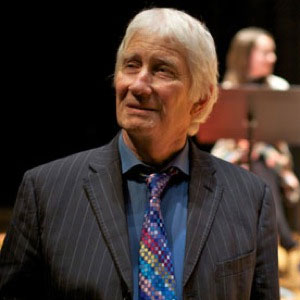BASBWE was sad to learn of the death of composer David Bedford, who passed away over the weekend.
David's music forms a significant part of British wind ensemble output, and aside from composing he was Director of BASCA
All at BASBWE send our condolences to his family.
Pete Meechan, 3 October, 2011.
The composer David Bedford, who has died of lung cancer aged 74, employed a wide range of styles and media in a half-century career that saw him move from young iconoclast to eclectic purveyor of music for all seasons and needs. In 1963, as a recent student of Luigi Nono in Venice, he wrote Two Poems for Chorus, settings of Kenneth Patchen texts. It remains one of his most compelling works, with a recording on Deutsche Grammophon's Avantgarde label. Bedford's later works retain some notational flexibility and an open mind on instrumentation. "Cans of dog biscuits are just as good as maracas," he suggested.
Fascinated by astronomy, he gave many of his works titles involving stars and space. He had become a regular reader of science fiction during his time as a porter at Guy's hospital in London in 1956, in lieu, as a conscientious objector, of regular national service. Arthur C Clarke's novel from that year, The City and the Stars, provided the basis for a cantata for the Crouch End Festival Chorus, which was premiered in 2001 with the then 83-year-old Clarke, on film, reading a narration between the movements.
Bedford was born in Hendon, north-west London, into a musical family. His grandmother, Liza Lehmann, was a composer; his mother, Lesley Duff, was a singer with the English Opera Group in the late 1940s, working with Benjamin Britten; later, Bedford's brother, Steuart, became a regular conductor at Aldeburgh. After going to Lancing college, West Sussex, David studied with Lennox Berkeley at the Royal Academy of Music, London, and then, in 1961, with Nono. On returning to London, he initially earned much of his living by schoolteaching. This was the first impulse for his many compositions for children and amateur performers.
For a while, he remained something of a modernist, if an extremely lyrical one. The instrumentalists of Music for Albion Moonlight (1965), for soprano and sextet, with words by Patchen, are asked to interpret the word "sklitter". The Tentacles of the Dark Nebula (1969), also based on Clarke, and written for the tenor Peter Pears and string sextet, uses some exquisite "extended" techniques for its string instruments.
Even when he became more mainstream, Bedford's music could still be freely experimental in its use of improvisatory procedures. Unorthodox performing techniques were happily integrated into concert works: key-rattling for woodwind, scraping with the fingernail for strings, singers being asked to imitate instruments, and even to inhale helium gas to raise their voices to an hysterical pitch in The Song of the White Horse (1978), for children's choir and orchestra.
On occasion, kazoos and metronomes were deployed; in With 100 Kazoos (1971), for 11 players, the instruction to interpret some pictures included in the score, ranging from star maps to illustrations suitable for children's books, brought the composer into conflict with Pierre Boulez, the intended conductor of the work's premiere, and it had to await direction by someone better able to identify with the composer's sense of humour. Bedford's partiality for the bizarre and even ridiculous was never in doubt. In the early 1970s, it found expression in work titles such as Nurse's Song With Elephants, settings of William Blake for singer and 10 guitars (1971), released on John Peel's Dandelion label.
In the late 1960s, Bedford moved into pop music, working with Kevin Ayers and his rock group The Whole World. I well remember the premiere of The Garden of Love (1970): a piece, again inspired by Blake, for chamber ensemble and Ayers's group. It included the saxophonist Lol Coxhill, and the Coxhill-Bedford Duo made recordings of vaudeville and British music-hall songs. Another band member was Mike Oldfield, whose highly successful Tubular Bells album was released in 1973: Bedford was involved in its first performance, and orchestrated the work for a further album, The Orchestral Tubular Bells (1975). His involvement in the pop world led him to compose several concept albums, including The Rime of the Ancient Mariner (1975) and The Odyssey (1976).
A flexible approach to notation proved an advantage when working with pop musicians who lacked conventional music-reading skills, and with children. The combination of this and Bedford's talents as both composer and arranger meant that he could turn his hand to almost any forces and musical circumstances.
Though perhaps best known in concert halls during the 1960s and 70s, Bedford always remained in the public ear, whether as composer of concert or educational music, as an arranger for Billy Bragg, Elvis Costello and many others, or as a film composer, with credits including The Killing Fields (1984), Orlando (1992) and several Hammer House of Mystery and Suspense TV series.
Contributions to the repertoire for wind orchestra include Sun Paints Rainbows On the Vast Waves (1982), commissioned by the Huddersfield contemporary music festival. Skilled and non-skilled musicians were combined in such works as Seascapes (1986), for symphony orchestra with schoolchildren, and Stories from the Dreamtime (1991), written for 40 deaf children and orchestra. The Wreck of the Titanic, a large-scale work also involving schoolchildren, will mark the 2012 centenary of the ship's sinking.
With his first wife, Maureen Parsonage, Bedford had two daughters; with his second, Susan Pilgrim, another two daughters; and with his third, Allison Powell, a son and two daughters. The first two marriages ended in divorce. He is survived by Allison, his children and Steuart.
Share this Article:



